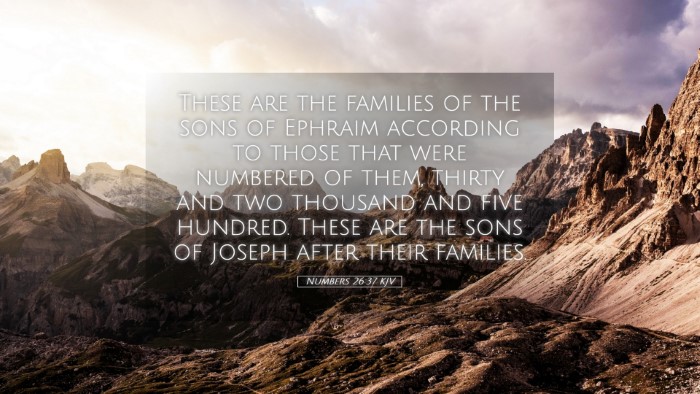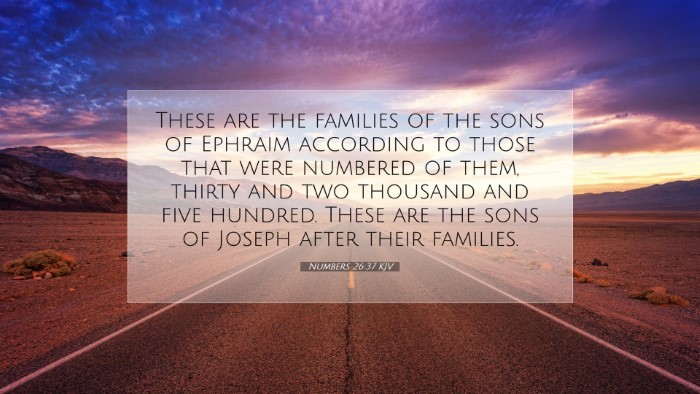Commentary on Numbers 26:37
Verse Reference: Numbers 26:37 - "These are the families of Benjamin: from them were numbered twenty-five thousand six hundred." (NIV)
Introduction
Numbers 26:37 presents a concise yet rich portrayal of the tribe of Benjamin, a tribe of significance in the Hebrew Bible. This verse is part of a larger census taking place in the wilderness, aiming to prepare the Israelites for entering the Promised Land. The enumeration of the tribes reveals not merely numbers but the social, historical, and spiritual identity of the Israelites.
The Importance of the Census
This passage fits into the broader context of the Book of Numbers, which focuses on organization, identity, and preparation for conquest. The census indicated God's faithful preservation of the tribes despite the trials and judgments faced during the wilderness wanderings.
Insights from Matthew Henry
Matthew Henry emphasizes that the purpose of the census was not only to count but to account for the blessings of God’s people. He notes the prominence of the tribe of Benjamin, as they presented a significant number amidst the other tribes, supporting their importance in the narrative of Israel.
Analysis of the Tribe of Benjamin
Benjamin, the youngest son of Jacob, is often identified with several key biblical figures, including Saul, the first king of Israel, and the apostle Paul. The tribe's characteristics are significant in biblical history.
Historical Context
Albert Barnes discusses the historical context of the tribe, pointing out their geographical location and military prowess. Benjamin's territory included key cities such as Jerusalem, which would become Israel's capital. The tribe's significance is underlined through their strategic positioning and influential leaders.
Spiritual Dimensions
In exploring the spiritual dimensions, Adam Clarke interprets the census as a manifest testimony of God's covenant promise. The number of 25,600 indicates not just physical beings but spiritual lives guided by God's sovereign purpose and favor. God’s care is evident even in the midst of trials.
Social and Cultural Implications
The enumeration of families and numbers within the tribe builds a picture of a healthy, vibrant community sustained by God through adversity. This shedding of light on the numbers contributes to our understanding of ancient Israel's demographic framework and tribal relations.
- Tribal Identity: Each tribe held distinct symbols of identity, culture, and spiritual heritage. The family names recorded carried legacies that informed the community's ethos.
- Role in Israelite Society: The tribe of Benjamin played a crucial role in various battles, contributing strategically to Israel’s military exploits, as highlighted by various biblical narratives.
- Prophetic Foreshadowing: Benjamin signifies not only presence but also the prophetic foreshadowing of future events, recalling their distinct contributions and the eventual rise of monarchy through Saul.
Theological Reflections
Theological insights from the passage also emerge, allowing contemporary readers to ponder God's ongoing work in their communities. The counting serves as an assurance of God’s faithfulness and roles designated for each tribe within the larger mission.
God’s Faithfulness and Blessing
Matthew Henry reminds readers that this record serves to illustrate the faithfulness of God to His covenant, entrusting each tribe mission that needs to be fulfilled. The specific numbering of Benjamin highlights that while they were few, they had been preserved and blessed.
Reflections on Community and Identity
Albert Barnes urges readers to reflect on the notion of community. Each number represents individuals and families, thus calling contemporary believers to consider their communal identity in Christ. The church as a body represents parallels to these tribes, working together towards a common divine purpose.
Conclusion
In summary, Numbers 26:37 encapsulates a wealth of theological, historical, and spiritual insights for today’s readers. The text is not merely a listing of numbers but a testament to God’s covenantal faithfulness, the significance of tribal identity, and the call for modern communities of faith to recognize their part in God's unfolding story.
Final Exhortation: As one meditates on this verse, consider what tribe you identify with in the contemporary church and how God may be using your unique background and identity to fulfill His divine purposes.


